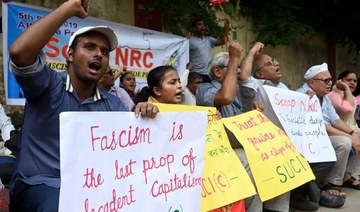NEW DELHI: A law that will close 600 Islamic schools in India’s northeastern state of Assam has caused an outcry, with critics saying authorities are trying to polarize society and create religious tension ahead of regional elections in March.
Under the new law, enacted by an administration dominated by India’s ruling Bharatiya Janata Party (BJP) and passed on Wednesday, state-run madrasas will be converted into regular schools.
“The government is gradually making the Muslims of the state helpless by interfering with our ways of life,” Isfaqul Hussain, an activist based in Tezpur, Assam, told Arab News on Thursday. “The BJP government is trying to push the Muslim community to the corner just to polarize society and win the trust of the non-Muslim community just before the elections.”
In Assam, 30 percent of the 30 million population is Muslim. Assam’s education minister, Himanta Biswa Sarma, said the move was aimed at taking the Muslim community “forward” and defended the new law.
“After 10 years, the Muslim children who become doctors and engineers from these schools, they will be indebted to our government,” he said.
BACKGROUND
30 percent of Assam state population is Muslim
Outcry in northeast India as government shuts 600 Islamic schools.
Mohammad Fakaruddin Ahmad teaches at Noorpur Jut Senior School, a madrasa in Sonitpur district. He disagreed with the minister’s assertion.
“Our madrasas, like other schools, teach science and maths and other subjects and produce doctors and engineers too. Madrasas follow the education curriculum of the state government and we teach secular education to our students, besides having a course in Arabic and Islamic studies.”
Hiren Gohain, a prominent public intellectual from Assam, felt the government was worried about the name “madrasa” rather than education. “Political motive is the uppermost in their mind,” he told Arab News. “The worry is that next time they would start changing the names of places having Islamic names.” He said it was “part of the pattern” to undermine Muslim minorities in Assam and coerce them to fall into the ruling party’s “political construct.”
Anowar Hussain, a lawyer in the state capital of Guwahati, described the law as unconstitutional.
“The constitution gives rights to the minority communities to manage their educational institutions. This is an unconstitutional bill,” he said. “The government’s focus is not minority’s education but election, and how to win the minds of the local Assamese by polarizing the situation just before the elections.”
The opposition Congress party also accused the BJP of attempting to create religious tensions in the state ahead of the March polls.
“Why the bill just 100 days before the elections? They want to create religious tension in Assam to win the elections,” Congress party spokesman Bhupen Borah
told Arab News.
The BJP, which won the state for the first time in 2016, faces losing local votes after there were protests against the controversial Citizenship Amendment Act (CAA), a law enacted in late 2019 to fast-track the granting of Indian citizenship to non-Muslim migrants from Bangladesh, Afghanistan and Pakistan who have been living in the country without documents.
The law angered the native Assamese who have long demanded the expulsion of all undocumented residents who entered the state after March 25, 1971.
“The BJP came on the promise of throwing foreigners out of the state, but they could not do that. They could not give jobs to the people, so this polarizing tactic is the only weapon left with the party,” he said.














